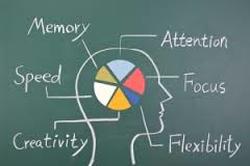Psychological Assessment

Psychological assessment uses a combination of techniques to help arrive at some hypotheses about an individual and their cognition, behavior, emotions, capabilities, and personality. Psychological testing is available for both children and adults. Evaluations are often helpful to assess the strengths/weaknesses of an individual. For children, adolescents, and young adults, this information can be especially helpful in addressing specific needs and to optimize learning and performance in the classroom. Testing results can also lead to access to appropriate academic accommodations in the elementary, secondary, or college setting.

A psychological evaluation includes:
Clinical Interview
Behavioral Observations
Self-report inventories
Standardized/norm-referenced testing
Common referrals for psychological testing include:
ADHD - Attention Deficit Hyperactivity Disorder (ADHD) is a neurobehavioral disorder of childhood that can continue into adulthood. There are three subtypes of ADHD, predominantly inattentive type, predominantly hyperactive-impulsive type, and combined type, but all involve difficulty paying attention and staying focused.
Autism Spectrum Disorder - Autism is a neuro-developmental disorder affecting an individual’s communication, socialization, and behavior. It is believed to have a genetic basis with a course influenced by environmental events.
IQ testing (required for most gifted programs) - Privately admistered comprehensive IQ tests like the most recent editions of the Wechsler Intelligence Scale - Fifth Edition (WISC-V) or the Stanford Binet - Fifth Edition (SB-5) are considered more reliable and valid, and offer parents and teachers more information, than the group IQ tests often given in the schools. Private testing results can also help parents in educational planning, help determine whether a child may benefit from some form of acceleration, offer insight into a child's behavior and learning characteristics, and help determine eligibility for a special school program. Most, but not all, school districts will consider private testing as part of the selection process for enrollment in gifted programming
Learning Disabilities - Learning disabilities manifest themselves in the main academic areas of reading, writing, and mathematics. They often have a genetic basis and underlying brain differences. Learning disabilities are common and are not the fault of the individual or the family and fortunately may be treated by a variety of educational interventions.
Neuropsychological - Neuropsychological testing investigates the relationship between the brain and behavior. Data are gathered through the evaluation process. This begins with an in-depth interview regarding developmental, educational, medical, and social history.
Personality - Personality assessment is helpful in a number of circumstances. They may be requested by a mental health professional to inform treatment planning or as a method to increase insight into relationships or life goals.
Clinical Interview
Behavioral Observations
Self-report inventories
Standardized/norm-referenced testing
Common referrals for psychological testing include:
ADHD - Attention Deficit Hyperactivity Disorder (ADHD) is a neurobehavioral disorder of childhood that can continue into adulthood. There are three subtypes of ADHD, predominantly inattentive type, predominantly hyperactive-impulsive type, and combined type, but all involve difficulty paying attention and staying focused.
Autism Spectrum Disorder - Autism is a neuro-developmental disorder affecting an individual’s communication, socialization, and behavior. It is believed to have a genetic basis with a course influenced by environmental events.
IQ testing (required for most gifted programs) - Privately admistered comprehensive IQ tests like the most recent editions of the Wechsler Intelligence Scale - Fifth Edition (WISC-V) or the Stanford Binet - Fifth Edition (SB-5) are considered more reliable and valid, and offer parents and teachers more information, than the group IQ tests often given in the schools. Private testing results can also help parents in educational planning, help determine whether a child may benefit from some form of acceleration, offer insight into a child's behavior and learning characteristics, and help determine eligibility for a special school program. Most, but not all, school districts will consider private testing as part of the selection process for enrollment in gifted programming
Learning Disabilities - Learning disabilities manifest themselves in the main academic areas of reading, writing, and mathematics. They often have a genetic basis and underlying brain differences. Learning disabilities are common and are not the fault of the individual or the family and fortunately may be treated by a variety of educational interventions.
Neuropsychological - Neuropsychological testing investigates the relationship between the brain and behavior. Data are gathered through the evaluation process. This begins with an in-depth interview regarding developmental, educational, medical, and social history.
Personality - Personality assessment is helpful in a number of circumstances. They may be requested by a mental health professional to inform treatment planning or as a method to increase insight into relationships or life goals.